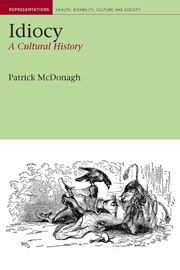Book contents
- Frontmatter
- Contents
- Preface and acknowledgements
- 1 Introduction: idiocy, culture and human relations
- 2 ‘Stripping our own hearts naked’: William Wordsworth and John Wilson read ‘The Idiot Boy’
- 3 A ‘pupil of innocent Nature!’ The wild boy of Aveyron goes to Paris
- 4 Diminished men: masculinity and idiocy
- 5 Essential women: femininity and idiocy
- 6 Holy fools, witty fools, depraved fools: folly, innocence and sin
- 7 History, society, economy: holy fools and idiots come home in nineteenth-century literature
- 8 Barnaby Rudge, idiocy and paternalism: assisting the ‘poor idiot’
- 9 Innocence, philanthropy and economics: the new ‘asylum’ idiot
- 10 Sensational idiocy
- 11 ‘The sins of the fathers’: idiocy, evolution and degeneration
- 12 Danger and degeneracy: the threat of the urban idiot
- 13 The problem of the feeble-minded: the Royal Commission, eugenics and eternal chaos
- Epilogue
- Bibliography
- Index
11 - ‘The sins of the fathers’: idiocy, evolution and degeneration
- Frontmatter
- Contents
- Preface and acknowledgements
- 1 Introduction: idiocy, culture and human relations
- 2 ‘Stripping our own hearts naked’: William Wordsworth and John Wilson read ‘The Idiot Boy’
- 3 A ‘pupil of innocent Nature!’ The wild boy of Aveyron goes to Paris
- 4 Diminished men: masculinity and idiocy
- 5 Essential women: femininity and idiocy
- 6 Holy fools, witty fools, depraved fools: folly, innocence and sin
- 7 History, society, economy: holy fools and idiots come home in nineteenth-century literature
- 8 Barnaby Rudge, idiocy and paternalism: assisting the ‘poor idiot’
- 9 Innocence, philanthropy and economics: the new ‘asylum’ idiot
- 10 Sensational idiocy
- 11 ‘The sins of the fathers’: idiocy, evolution and degeneration
- 12 Danger and degeneracy: the threat of the urban idiot
- 13 The problem of the feeble-minded: the Royal Commission, eugenics and eternal chaos
- Epilogue
- Bibliography
- Index
Summary
‘Everybody knows the consequences of prolonged intermarriages between any sort of people who are few enough to be almost all blood relations’, wrote Harriet Martineau in her 1854 Household Words article ‘Idiots Again’.
The world was shocked and grieved, some years since, at the oldest baronage in England ‘going out at the ace of diamonds’ – expiring in the disgrace of cheating at cards. The world ought to be quite as much shocked and grieved at seeing – what has been seen, and may be seen again – the honours of the same ancient birth being extinguished in a lunatic asylum.
(Martineau 1854: 197)The country's oldest families were being led to lunacy and idiocy thanks to consanguineous marriages, she argues. Martineau then draws on Dr Samuel Gridley Howe's On the Causes of Idiocy (published in 1848 in the United States but not printed in Britain until a full decade later), quoting his assertion ‘in his Report on Idiocy in Massachusetts, that “the law against the marriage of relatives is made out as clearly as though it were written on tables of stone”’ (197). And then she cites his evidence: Howe's study of seventeen families with parents who were blood relations. Across these households, she notes, there were ninety-five children. ‘What were these children like?’, Martineau asks.
Imagine a school of ninety-five children, of all ages, or the children of a hamlet at play, and think what the little crowd would look like; and then read this! Of these ninety-five children, one was a dwarf. […]
- Type
- Chapter
- Information
- IdiocyA Cultural History, pp. 257 - 288Publisher: Liverpool University PressPrint publication year: 2008

